
List of Russian language poets
Encyclopedia
This is a list of authors who have written poetry in the Russian language
.
For the plain text list, see :Category:Russian poets.
See also: List of Russian language writers, List of Russian language novelists, List of Russian language playwrights, List of Russian artists, List of Russian architects, List of Russian inventors, List of Russian explorers, Russian literature
, Russian culture
Russian language
Russian is a Slavic language used primarily in Russia, Belarus, Uzbekistan, Kazakhstan, Tajikistan and Kyrgyzstan. It is an unofficial but widely spoken language in Ukraine, Moldova, Latvia, Turkmenistan and Estonia and, to a lesser extent, the other countries that were once constituent republics...
.
For the plain text list, see :Category:Russian poets.
See also: List of Russian language writers, List of Russian language novelists, List of Russian language playwrights, List of Russian artists, List of Russian architects, List of Russian inventors, List of Russian explorers, Russian literature
Russian literature
Russian literature refers to the literature of Russia or its émigrés, and to the Russian-language literature of several independent nations once a part of what was historically Russia or the Soviet Union...
, Russian culture
Russian culture
Russian culture is associated with the country of Russia and, sometimes, specifically with ethnic Russians. It has a rich history and can boast a long tradition of excellence in every aspect of the arts, especially when it comes to literature and philosophy, classical music and ballet, architecture...
A
| Portrait | Person | Notable works | Sample |
|---|---|---|---|
| Bella Akhmadulina (1937–2010) |
The String The Garden A Guiding Sound Once in December |
"Rain Flogs My Face..." Rain flogs my face and collar-bones, a thunderstorm roars over musts. You thrust upon my flesh and soul, like tempests upon ships do thrust. I do not want, at all, to know, what will befall to me the next – would I be smashed against my woe, or thrown into happiness. In awe and gaiety elated, like a ship, that’s going tempests through, I am not sorry that I’ve met you, and not afraid to love you, too. (Translation by Yevgeny Bonver) |
|
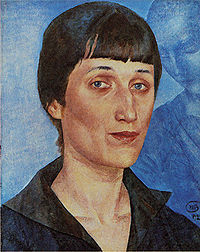 |
Anna Akhmatova Anna Akhmatova Anna Andreyevna Gorenko , better known by the pen name Anna Akhmatova , was a Russian and Soviet modernist poet, one of the most acclaimed writers in the Russian canon.Harrington p11... (1889–1966) |
Evening Requiem The Rosary Poem Without a Hero |
"Like a White Stone" Like a white stone deep in a draw-well lying, As hard and clear, a memory lies in me. I cannot strive nor have I heart for striving: It is such pain and yet such ecstasy. It seems to me that someone looking closely Into my eyes would see it, patent, pale. And, seeing, would grow sadder and more thoughtful Than one who listens to a bitter tale. The ancient gods changed men to things, but left them A consciousness that smoldered endlessly, That splendid sorrows might endure forever. And you are changed into a memory. |
| Margarita Aliger Margarita Aliger Margarita Iosifovna Aliger was a famous Soviet poet, translator, and journalist.-Biography:She was born in Odessa in a family of Jewish office workers; the real family name was Zeliger . As a teenager she worked at a chemical plant... (1915–1992) |
Zoya Railroad The Year of Birth Stones and Grass |
||
 |
Daniil Andreev (1906–1959) |
Russian Gods The Iron Mystery |
|
| Innokenty Annensky Innokenty Annensky Innokentiy Fyodorovich Annensky was a poet, critic and translator, representative of the first wave of Russian Symbolism... (1855–1909) |
Quiet Songs Cypress Box |
||
| Pavel Antokolsky Pavel Antokolsky Pavel Grigoryevich Antokolsky - a Russian poet, a nephew of Mark Antokolsky. His poem, "All we who in his name..." was written in 1956, the year of Nikita Khrushchev's "secret speech" condemning Stalinism, and widely circulated among student groups in the 1950s.Pavel Antokolsky translated in... (1896–1978) |
All We Who in His Name | Hate! Hate, be a faithful prop, and find The words most biting and most fit, So that filth brings no vertigo To him who bends so close to it; So that the honest artist spurns The facile phrase, the weak excuse, And is the first one to detect The coward's lie, the traitor's truce; So that the artist may be schooled In probing, judging, and may sense Just what a deposition means And learn the tongue of evidence; So that he trains his eye to catch A wolfish trick, and warns us all If silently the enemy Slips past, or waits and hugs the wall, Or if, again, with zealous mien And upraised fist the foe votes "Aye" Not caught red-handed yet, not known And named as one who lives a lie; Until our enemy must run From verse as one who on the stair Hears the police, then drops in dread And cannot cover his despair. |
|
| Aleksey Apukhtin Aleksey Apukhtin -Biography:Following the traditions of amorous gypsy romance, he introduced into this genre much of his own artistic temperament. Many of his romances were set to music by his friend Pyotr Tchaikovsky and by other well-known composers .Apukhtin's reputation as a poet was further strengthened in... (1840–1893) |
|||
| Eduard Asadov Eduard Asadov -External links:** **http://grani.ru/Culture/Literature/m.67885.html*http://www.lib.ru/POEZIQ/ASADOW/... (1923–2004) |
|||
| Nikolay Aseyev Nikolay Aseyev Nikolay Nikolaevich Aseyev, was a Russian poet.Nikolay Nikolaevich Aseyev was born in the city of Lgov in the region of Kursk. His first poetic collections, "Night Flute", written in 1914, and "Zor", written in 1914 in Russian Futurist style. He was awarded a government honor for the latter poem... (1889–1963) |
Zor Night Flute |
||
 |
Lera Auerbach Lera Auerbach Lera Auerbach is a Russian-born American composer and pianist.-Early life & education:Auerbach was born in Chelyabinsk, a city in the Urals bordering Siberia. She holds degrees in piano and composition from The Juilliard School, where she studied piano with Joseph Kalichstein and composition... (born 1973) |
||
| Gennadiy Aygi Gennadiy Aygi Gennadiy Nikolaevich Aygi was a Chuvash poet and a translator. His poetry is written both in Chuvash and in Russian.He was born in the village of Shaimurzino , Chuvashia and started writing poetry in the Chuvash language in 1958.... (1934–2006) |
B
| Portrait | Person | Notable works | Sample |
|---|---|---|---|
| Eduard Bagritsky Eduard Bagritsky Eduard Bagritsky , real name Dzyubin , was an important Russian and Soviet poet of the Constructivist School.He was a Neo-Romantic early in his poetic career; he was also a part of the so-called Odessa School of Russian writers... (1895–1934) |
February | ||
 |
Konstantin Balmont Konstantin Balmont Konstantin Dmitriyevich Balmont was a Russian symbolist poet, translator, one of the major figures of the Silver Age of Russian Poetry.-Biography:Konstantin Balmont was born in v... (1867–1942) |
Under the Northern Sky Let's Be as the Sun |
Centuries of Centuries Will Pass Long centuries of centuries will pass, unsighted Milleniums as locusts in deathy clouds descend, And in the muttering of centuries affrighted The same enduring firmament will watch the end. The dumb, dead firmament that God will not remember, Who breathes Eternity behind the farther skies, Beyond the fading of the last star's last slow ember, Beyond the utter threshold words may scrutinize. Forever cold, that starry desert, clouds out-topping, Is flung forth, alien to the end, on space, When tearing comet-fires will crumble with it, dropping As dumbly burning tears from a despairing face. |
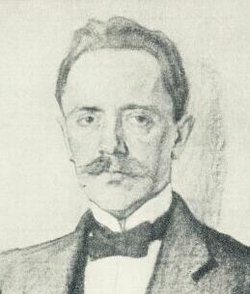 |
Jurgis Baltrušaitis Jurgis Baltrušaitis Jurgis Baltrušaitis was a Lithuanian Symbolist poet and translator, who wrote his works in Lithuanian and Russian. In addition to his important contributions to Lithuanian literature, he was noted as a political activist and diplomat... (1873–1944) |
The Pendulum When tne dumb darkness most heavily clings, Rhythmic and ruthless my pendulum swings. Rustily creaking or whining dismay, Urging each tarrying moment away. Longing, it seems, for the days that are fled, Down ancient stairways resounds someone's tread. Heavy the footfall on flagstones unlit, Lower and lower and down to the pit. Praying, it seems, for a long-vanished shore, Dumbly the Helmsman with slow stubborn oar Brokenly rows me, morosely alone, Into my harbor, afar and unknown. Evil the Ferryman, darkly he pounds; Farther and farther, more muffled resounds, Hostile and hopeless, the long downward climb: Cold, ineluctable footsteps of Time. |
|
| Evgeny Baratynsky Evgeny Baratynsky Yevgeny Abramovich Baratynsky was lauded by Alexander Pushkin as the finest Russian elegiac poet. After a long period when his reputation was on the wane, Baratynsky was rediscovered by Anna Akhmatova and Joseph Brodsky as a supreme poet of thought.- Life :Of noble ancestry, Baratynsky was... (1800–1844) |
Eda The Gypsy The Last Poet Autumn |
Be Mirthful Now Be mirthful now, for nothing stays, Our good and evil both are brief. Capricious Fate leads many ways, Sometimes to joy, sometimes to grief, And is no friend to constancy. Listen, you whose lives are bright, For the uncertain hours be Winged for flight. Do not repine, since nothing stays; What matter if it chance at last That unexpectedly our days By cruel sorrow are o'ercast? Upon this changeful earth of ours, The gods from pain took half its stings When alike to all the hours They gave wings. |
|
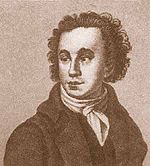 |
Ivan Barkov Ivan Barkov Ivan Semyonovich Barkov was a Russian poet, the author of erotic "Shameful Odes". He was a student of Mikhail Lomonosov, whose works he frequently parodied. He was also a translator and editor at the Russian Academy of Sciences.-Biography:... (1732–1768) |
Luka Mudischev | |
| Anna Barkova Anna Barkova Anna Alexandrovna Barkova , July 16, 1901 – April 29, 1976, was a Soviet poet, journalist, playwright, essayist, memoirist, and writer of fiction. She was imprisoned for more than 20 years in the Gulag.-Early life:... (1901-1976) |
Tatar Anguish | ||
| Agniya Barto Agniya Barto Agniya Lvovna Barto, , was a Soviet Jewish poet and children's writer.-Biography:Agniya was born Getel Leybovna Volova to the jewish family of a Moscow veterinarian named Lev Nikolaevich Volov. She studied at a ballet school. She liked poetry very much and soon started to write her own, trying to... (1906–1981) |
Toys Mishka the Petty Thief |
||
| Alexander Bashlachev Alexander Bashlachev Alexander Nickolaevich Bashlachev was a Russian poet, musician, guitarist, and singer-songwriter.-Early life:Bashlachev was born in Cherepovets, Soviet Union, the son of Nikolai Bashlachev and Nellie Bashlacheva.... (1960–1988) |
|||
| Konstantin Batyushkov Konstantin Batyushkov Konstantin Nikolayevich Batyushkov was a Russian poet, essayist and translator of the Romantic era.-Biography:The early years of Konstantin Batyushkov's life are difficult to reconstruct... (1787–1855) |
|||
| Demyan Bedny Demyan Bedny Demyan Bedny, was the pen name of Soviet Russian poet, Bolshevik and satirist Yefim Alekseevich Pridvorov .-Life:Efim Pridvorov was born to a poor family in Gubovka, in what is now Kirovohrad Oblast in Ukraine. He attended the village school followed by a feldsher training college in Kiev. This... (1883–1945) |
No One Knew (April 22, 1870) It was a day like any other, The same dull sky, the same drab street. There was the usual angry pother From the policeman on his beat. Proud of his fine new miter's luster, The archpriest strutted down the nave; And the pub rocked with brawl and bluster, Where scamps gulped down what fortune gave. The market women buzzed and bickered Like flies above the honeypots. The burghers' wives bustled and dickered, Eyeing the drapers' latest lots. An awe-struck peasant stared and stuttered, Regarding an official door Where yellow rags of paper fluttered: A dead ukase of months before. The fireman ranged his tower, surveying The roofs, like the chained bears one sees; And soldiers shouldered arms, obeying The drill sergeant's obscenities. Slow carts in caravans went winding Dockward, where floury stevedores moiled; And, under convoy, in the blinding Dust of the road, a student toiled, And won some pity, thus forlorn, From the drunk hand who poured his scorn In curses on some pal and brother. . . . Russia was aching with the thorn And bearing her old cross, poor mother. That day, a day like any other, And not a soul knew that Lenin Vladimir Lenin Vladimir Ilyich Lenin was a Russian Marxist revolutionary and communist politician who led the October Revolution of 1917. As leader of the Bolsheviks, he headed the Soviet state during its initial years , as it fought to establish control of Russia in the Russian Civil War and worked to create a... was born! |
||
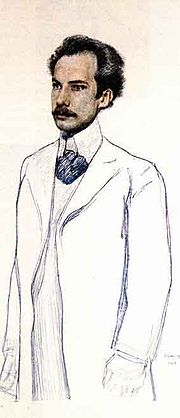 |
Andrey Bely Andrei Bely Andrei Bely was the pseudonym of Boris Nikolaevich Bugaev , a Russian novelist, poet, theorist, and literary critic. His novel Petersburg was regarded by Vladimir Nabokov as one of the four greatest novels of the 20th century.-Biography:... (1880–1934) |
Urn Gold in Azure Christ Has Risen The First Encounter |
Euthanasia The shining and ponderous goblet I empty: the earth drops below me, All things sink away, I am treading Cold space the vast void the dim ether. But distant, in ancient space looming, My glimmering goblet: the Sun. I look far below me are lying The rivers, the forests, the valleys, Estranged in the vanishing distance. A cloud, blowing fog on my eyelids, Trails gossamer gold in its going. The flickering landscape is burning Its last: mid-day stars newly-kindled Look into my soul, sparkling: "Welcome," With radiance silently streaming: "The end of long wanderings, brother, Lies here, in your motherland, welcome!" Slow hour upon hour in procession, Slow centuries, smiling, pass onward. In ancient space proudly I lift it, My glimmering goblet: the Sun. |
| Olga Bergholz (1910–1975) |
|||
| Aleksandr Bestuzhev Aleksandr Bestuzhev Alexander Alexandrovich Bestuzhev , , was a Russian writer and Decembrist. After the Decembrist revolt he was sent into exile to Caucasus where Russian Empire was waging the war against the Circassians. There writing under the pseudonym Marlinsky he became known as a romantic poet, short story... (1797–1837) |
Kabardinian song "On Kazbek the clouds are meeting, Like the mountain eagle-flock; Up to them, along the rock, Dash the wild Uzdens retreating; Onward faster, faster fleeting, Routed by the Russian brood, Foameth all their track with blood. "Fast behind the regiments yelling, Lance and bayonet raging hot, And the seed of death their shot. On the mail the sabre knelling, Gallop, steed! for far thy dwelling, See! they fall, but distant still Is the forest of the hill! "Russian shot our hearts is rending, Falls the Mullah on his knee, To the Lord of Light bows he, To the Prophet he is bending; Like a shaft his prayer ascending, Upward flies to Allah's throne Il-Allah! Oh, save thine own! "Ah, despair! What crash like thunder! Lo! a sign from heaven above! Lo! the forest seems to move, Crashes, murmurs, bursts asunder! Lower, nearer, wonder! wonder! Safe once more the Muslim bold In their forest mountain-hold!" |
||
 |
Alexander Blok Alexander Blok Alexander Alexandrovich Blok was a Russian lyrical poet.-Life and career:Blok was born in Saint Petersburg, into a sophisticated and intellectual family. Some of his relatives were literary men, his father being a law professor in Warsaw, and his maternal grandfather the rector of Saint Petersburg... (1880–1921) |
"Into Crimson Dark" Into crimson dark thou goest, Thy vast orbits mock the eye. Small the echo that thou throwest, Far, I hear thy footfalls die. Art thou near? too far for greeting? Lost in topless altitudes? Shall I wait a sudden meeting Where sonorous stillness broods? In the solitude resounding Distant footsteps echo free. Is it thou who flamest, bounding Circles of infinity? |
|
| Valeri Brainin-Passek Valeri Brainin Valeri Brainin , Russian/German musicologist, music manager, composer, and poet.... (born 1948) |
|||
| Joseph Brodsky Joseph Brodsky Iosif Aleksandrovich Brodsky , was a Russian poet and essayist.In 1964, 23-year-old Brodsky was arrested and charged with the crime of "social parasitism" He was expelled from the Soviet Union in 1972 and settled in America with the help of W. H. Auden and other supporters... (1940–1996) |
|||
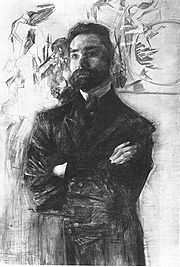 |
Valery Bryusov Valery Bryusov Valery Yakovlevich Bryusov was a Russian poet, prose writer, dramatist, translator, critic and historian. He was one of the principal members of the Russian Symbolist movement.-Biography:... (1873–1924) |
The Fierce Birds Kindling the air, fierce birds with feathers of fire, Through the white portals of Paradise flamed like desire. Virgin vistas reared, lit with quivering red, And beyond seas were the trackless wanderers fled. But on the pillars of marble, on the threshold were thrown Crimson shadows incredible, sunk in the stone. And, under the arch, in eternity's radiance hidden, Angels exulted in fruits that are secret and sweet and forbidden. |
|
| Ivan Bunin (1870–1953) |
In An Empty House From the walls the paper's blue is vanished, The daguerreotypes, the ikons banished. Only there the deepened blue appears Where these hid it, hanging through the years. From the heart the memory is perished, Perished all that long ago it cherished! Those remain, of whom death hides the face, Leaving their yet unforgotten trace. |
||
| Anna Bunina Anna Bunina Anna Petrovna Bunina was a Russian poet. She was the first major Russian woman writer, and the first Russian woman to make a living solely from literary work. She was an ancestor of Nobel Prize winner Ivan Bunin.-Biography:... (1774-1829) |
|||
C
| Portrait | Person | Notable works | Sample |
|---|---|---|---|
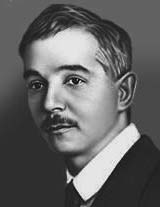 |
Sasha Chorny (1880–1932) |
||
| Korney Chukovsky Korney Chukovsky Korney Ivanovich Chukovsky was one of the most popular children's poets in the Russian language. His poems, Doctor Aybolit , The Giant Roach , The Crocodile , and Wash'em'clean have been favourites with many generations of Russophone children... (1882–1969) |
Aybolit Doctor Aybolit Doctor Aybolit is a fictional character from the children's poems Aybolit and Barmaley by Korney Chukovsky. The name may be translated as "Ouch, [it] hurts!"The origins of Aybolit can be traced to Doctor Dolittle by Hugh Lofting... Wash'em'clean Moidodyr Moydodyr is a 1923 poem for children by Korney Chukovsky about a magical creature by the same name. The name may be literally be translated as "Wash'em'clean", or "Clean 'til Holes".... The Crocodile The Giant Roach |
||
| Georgy Chulkov Georgy Chulkov Georgy Ivanovich Chulkov was a Russian Symbolist poet, editor, writer and critic. In 1906 he created and popularized the theory of Mystical Anarchism.-Biography:... (1879–1939) |
Purple Autumn Purple Autumn unloosened her tresses and flung them On the heavens and over the dew-heavy fields. She came as a guest to the old, silent house, Singeing the grasses with red; Through the garden she moved,- Up the balcony; scarcely she touched The fragile old rails. She pushed the door-panel softly, Softly she entered the room, Sprinkling the rugs with her sun-yellow dust, Dropped a red leaf upon the piano. . . Ever after that hour, we heard her unceasing, her tireless rustling, Rustle and stir and soft whisper. And our hands suddenly met With no new words, new and forever false. As though we had hung a wreath of red roses On a black, wrought-iron door Leading into a vault Where lay the rotting body Of a beloved dream. Autumnal days were upon us, Days of inscrutable longing; We were treading the stairs Of autumnal passion. In my heart a wound, Like the lamp of an ikon, Burned and would not be quenched. The cup of autumnal poison We pressed to our lips. By the serpentine garden path Autumn had led us To crepuscular lilies Upon the pale, sand-humbled pond. And over the lilied waters and in the roses of evening, We loved, more superstitiously. And through the dark night, On the languorous bed, At the feet of my love, I loved death anew. The minutes rang tinkling like crystals At the brink of an autumn grave: Autumn and Death drunkenly clinked their glasses. I pressed my thirsty lips To the feet the ikon-lamp burnished, I drank the cup of love. Burned by the fires of sins, Stretched on the cross of lusts, Shamed, being needlessly faithless, I drank the cup of love. In the hour of ineffable dalliance I sensed the whisper Of autumn pain, of autumn passion. And kisses like keen needles Burned and pierced, Weaving a wreath of thorns. |
D
| Portrait | Person | Notable works | Sample |
|---|---|---|---|
 |
Denis Davydov Denis Davydov Denis Vasilyevich Davydov was a Russian soldier-poet of the Napoleonic Wars who invented a specific genre – hussar poetry noted for its hedonism and bravado – and spectacularly designed his own life to illustrate such poetry.-Biography:... (1784–1839) |
||
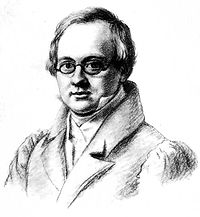 |
Anton Delvig (1798–1831) |
Ah, You Night... Ah, you night, you little night! Ah, you night, you stormy night! Why from early evening tide Even to the midnight late Twinkle not your little stars, Shineth not your full-orbed moon? You are veiled with darkling clouds! 'T is with you, I think, O night, Even as with me, young man, Villain grief has called on us! When the dire one takes abode Somewhere deep within the heart, You forget the lasses fair, Dances and obeisances; You forget from evening tide Even to the midnight late, Singing songs, to take delight In the chorus and the dance. No, you sob, you weep aloud, And, a sad and lonely lad, You upon your coarse straw bed Throw yourself as in the grave! |
|
| Andrey Dementyev Andrey Dementyev (poet) Andrey Dmitriyevich Dementyev is a Russian and Soviet poet, a laureate of Lenin’s Young Communist League Award , a USSR State Prize , and Bunin Prize .... (born 1928) |
|||
| Regina Derieva Regina derieva Regina Derieva is a Russian poet and writer who has published twenty books of poetry, essays, and prose. Derieva currently lives in Sweden.... (born 1949) |
|||
| Gavrila Derzhavin (1743–1816) |
The Stream of Time The stream of time, with onward sweep, Bears off men's works, all human things, And plunges o'er Oblivion's steep Peoples and kingdoms with their kings. If for a space amidst the swirl The lyre or trumpet some sustain, They're swept at last in ceaseless whirl, And none escape Fate's common main. |
||
| Ivan Dmitriev Ivan Dmitriev Ivan Ivanovich Dmitriev was a Russian statesman and poet associated with the sentamentalist movement in Russian literature.Dmitriev was born at his father's estate in the government of Simbirsk... (1760-1837) |
The Little Dove The little dove, with heart of sadness, In silent pain sighs night and day; What now can wake that heart to gladness? His mate beloved is far away. He coos no more with soft caresses, No more is millet sought by him, The dove his lonesome state distresses, And tears his swimming eyeballs dim. From twig to twig now skips the lover, Filling the grove with accents kind, On all sides roams the harmless rover, Hoping his little friend to find. Ah! vain that hope his grief is tasting, Fate seems to scorn his faithful love. And imperceptibly is wasting, Wasting away, the little dove! At length upon the grass he threw him, Hid in his wing his beak and wept; There ceased his sorrows to pursue him, The little dove for ever slept. His mate, now sad abroad and grieving, Flies from a distant home again. Sits by her friend, with bosom heaving, And bids him wake with sorrowing pain. She sighs, she weeps, her spirits languish. Around and round the spot she goes; Ah! charming Chloe 'slost in anguish, Her friend wakes not from his repose! |
||
| Nikolay Dobrolyubov (1836–1861) |
Death’s Jest What if I die? ‘Twere little grief! But one fear wrings my breast- Perhaps Death, too, may play on me A grim, insulting jest. I fear that over my cold corpse Hot tears may fall in showers; That someone, with a foolish zeal, May heap my bier with flowers; That friends may crowd behind my hearse With thoughts of grief sincere, And when I lie beneath the mould, Men’s hearts may hold me dear; That all which I so eagerly And vainly used to crave In life, may brightly smile on me When I am in my grave! |
||
| Yevgeniy Dolmatovsky Yevgeniy Dolmatovsky Yevgeniy Aronovich Dolmatovsky was a Soviet poet and a Russian popular song lyricist. He was born and died in Moscow.-Examples of his songs:* Ballad of the Siberian Land - 1947* Yearning for the Motherland - 1948* Song of the Forests (music by Domitri Shostakovich, Opus 81) - 1949** The Pioneers... (1915–1994) |
|||
| Spiridon Drozhzhin Spiridon Drozhzhin -Biography:Drozhzhin was born in the village of Nizovka, part of what is now Tver Oblast. His poems were first published in 1873. The son of a serf, he earned renown as a talented self-educated poet. He welcomed the October Revolution, which he saw as the realization of the people's hopes and... (1848-1930) |
|||
| Yulia Drunina Yulia Drunina Yulia Vladimirovna Drunina was a Russian poet. Her works are characterised with classical clarity, she often used real life experiences as a source of inspiration for her writings. Her own war experience had a long-lasting and painful impression on her... (1924–1991) |
E
| Portrait | Person | Notable works | Sample |
|---|---|---|---|
| Ilya Ehrenburg Ilya Ehrenburg Ilya Grigoryevich Ehrenburg was a Soviet writer, journalist, translator, and cultural figure.Ehrenburg is among the most prolific and notable authors of the Soviet Union; he published around one hundred titles. He became known first and foremost as a novelist and a journalist - in particular, as a... (1891–1967) |
The Tree The meek dew shone, the grass lay prostrate As humbly as a slave will lie, And veering from the roof the swallow Had sought the wide and tender sky. And you alone, great tree, remaining There at your post, stood straight and still, Lonely and stubborn as a soldier Whose duty was to hold the hill. And under fire you tossed and twisted, As through your boughs the torment ran, And when you met your mortal moment You died as gravely as a man. |
F
| Portrait | Person | Notable works | Sample |
|---|---|---|---|
 |
Afanasy Fet Afanasy Fet Afanasy Afanasyevich Fet , was a Russian poet regarded as one of the finest lyricists in Russian literature.-Origins:... (1812–1892) |
A Russian Scene Wondrous the picture, How homelike to me!— Distant plain whitening, Full moon on the lea; Light—in the heavens high, And snow flashing bright; Sledge in the distance In its lonely flight. |
|
| Konstantin Fofanov Konstantin Fofanov -Early life:Konstantin was born into a family of St. Petersburg merchants. His father had been born a peasant, but had risen to the merchant class through the selling of firewood. Konstantin was one of ten children. At the age of six he began attending a primary school. He later attended the cheap... (1862–1911) |
The Beggar There stood a beggar asking alms By the cathedral gate, His face bore torture marks of life— Pale, tired, blind—like fate. Thin, tired, pale and blind he begged A crust of bread alone. And some one pausing, placed within His outstretched hand—a stone. And even so I asked your love, I brought my dreams, my life—the while Unto my passion you replied Only with your cold smile! |
G
| Portrait | Person | Notable works | Sample |
|---|---|---|---|
| Cherubina de Gabriak Cherubina de Gabriak Cherubina de Gabriak was a literary pseudonym of Elisaveta Ivanovna Dmitrieva possibly together with Maximilian Voloshin.-Mysterious poet:... (1887–1928) |
|||
 |
Aleksei Gastev Aleksei Gastev Aleksei Kapitonovich Gastev was a participant in the Russian Revolution of 1905, a pioneer of scientific management in Russia, a trade-union activist and an avant garde poet.- Youth of a Revolutionary :... (1882–1939) |
||
| Mikhail Gerasimov Mikhail Gerasimov (poet) Mikhail Prokofyevich Gerasimov was one of the most widely-read working-class poets in early twentieth century Russia. Initially embracing the Bolshevik revolution as a liberating event and participating in the effort to create a new "proletarian culture," following the New Economic Policy he... (1889–1939) |
|||
| Zinaida Gippius Zinaida Gippius Zinaida Nikolaevna Gippius, was a Russian poet, playwright, editor, short story writer and religious thinker, regarded as a co-founder of Russian symbolism and seen as "one of the most enigmatic and intelligent women of her time in Russia".... (1869–1945) |
"I Seek For Rhythmic Whisperings" I seek for rhythmic whisperings Where noises bandy For life I listen wistfully In footless banter. I cast wide nets and tentative In lakes of sorrow. I go toward final tenderness By pathways sordid. I look for dewdrops glistering In falsehood's gardens. I save truth's globules glistening, From dust-heaps garnered. I fain would fathom fortitude Through years of wormwood And pierce the mortal fortalice, Yet live, a worldling. My cup, through ways impassable, To bear, untainted; By tenebrous bleak passages To joy attaining. |
||
| Nikolay Glazkov Nikolay Glazkov Nikolai Ivanovich Glazkov ; , was a Soviet poet renowned for his uncanny and ironic verse, his alcoholism, and for jokingly coining the term samizdat, which came to be internationally known.-Life:Glazkov was born in the village of Lyskovo, in what is now Nizhegorodskaya Oblast, Russia... (1919–1979) |
|||
| Fyodor Glinka Fyodor Glinka Fyodor Nikolaevich Glinka was a Russian poet and author.-Biography:Glinka was born at Smolensk in 1786, and was specially educated for the army. In 1803 he obtained a commission as an officer, and two years later took part in the Austrian campaign... (1786–1849) |
Moscow Wondrous city, ancient city, Thou enfoldest in thy walls Villages and smiling suburbs, Churches, palaces and halls. Thou art girt by grassy meadows, Gay with gardens, rich in flowers; Seven the hills are which thou crownest With thy temples, with thy towers. Thou unfoldest like a parchment Written by a giant hand, And beside thy little river Thou art glorious now and grand. Many are thine ancient churches Towering like the northern pine; Where can eye see streets so noble, Mother Moscow, as are thine? Capture Moscow's mighty Kremlin? Who on earth would boast the power? Who could rob the golden bonnet From the slender Ivan tower? Who could ever swing the Tsar-bell, Or the Tsar-gun overthrow? Reverence at the sacred gateway Who could ever fail to show? In thine awful hour of peril, When thy haughty neck was bent, All thy children, men of Russia, Felt with thee the punishment. White-walled city, them wast chastened Like a martyr in the fire; And thy river, boiling, hastened Onward to escape the pyre. Once a captive and dishonoured, In thine embers thou didst lie! Now arisen from thine ashes Changeless, lift thy head on high! Flourish through the countless ages, Moscow ! many-towered town. Thou art central heart of Russia, Russia's glory, Russia's crown! |
||
 |
Nikolay Gnedich Nikolay Gnedich Nikolay Ivanovich Gnedich was a Russian poet and translator best known for his idyll The Fishers... (1784–1833) |
The Fishers | |
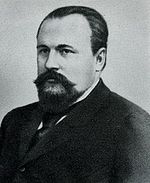 |
Arseny Golenishchev-Kutuzov Arseny Golenishchev-Kutuzov Arseny Arkadyevich Golenishchev-Kutuzov , was a Russian poet known in part for writing the texts of Modest Mussorgsky's two song cycles of the 1870s: Sunless and Songs and Dances of Death.... (1848–1913) |
||
| Dmitry Gorchakov Dmitry Gorchakov Prince Dmitry Petrovich Gorchakov was a Russian writer, dramatist and poet, best known for his satyrical verses and three comical operas, staged in the end of XVIII century.- Biography:... (1758-1824) |
|||
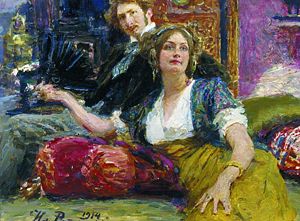 |
Sergey Gorodetsky (1884–1967) |
||
| Boris Golovin Boris Golovin Boris Golovin is a Russian singer-songwriter, musician, poet and novelist. Golovin published his first book of poetry in Moscow in 1987.-Education:1975 - 1979. Moscow State University, faculty of journalism.1982 - 1987... (born 1955) |
|||
| Aleksandr Griboedov (1794–1829) |
|||
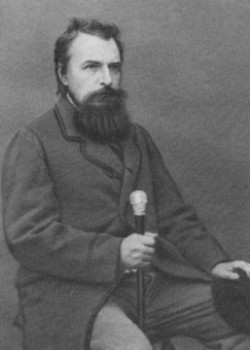 |
Apollon Grigoryev Apollon Grigoryev Apollon Aleksandrovich Grigoryev was a Russian poet, literary and theatrical critic, translator, memoirist, as well as the author of a number of popular songs and romances.... (1822–1864) |
||
| Oleg Grigoryev Oleg Grigoriev Oleg Grigoriev was a Russian poet and artist. He is regarded as a successor of the Oberiu tradition. Many of his short poems became modern folklore.-Biography:... (1943–1992) |
|||
| Isabella Grinevskaya Isabella Grinevskaya Isabella Grinevskaya was the pen name of Berta Friedberg, daughter of the author Abraham Shalom Friedberg and the first wife of Mordechai Spector.... (1864–1944) |
"The Mother" (World War 1) O Son of mine, forgive these tears. The tears that from my heart are wrung! E'en birch-trees for their reft boughs weep, The wild beasts for their young. And, dearest, how should I not weep? Nor dolorous grief o'er me prevail? Where strength and calm endurance draw To choke... a mother's wail? In offering to our native land We needs must of our own will part With what is lovelier than life. E'en though it break our heart. And so I freely offer thee To deadly battle with the foe. Though dearer to me than my life. Farewell! God with thee! Go! |
||
| Semyon Gudzenko Semyon Gudzenko Semyon Gudzenko who was a Soviet poet, of the World War II generation. He is often compared with Pavel Kogan and Semen Kirsanov.... (1922–1953) |
|||
| Nikolay Gumilyov Nikolay Gumilyov Nikolay Stepanovich Gumilev was an influential Russian poet who founded the acmeism movement.-Early life and poems:Nikolai was born in the town of Kronstadt on Kotlin Island, into the family of Stepan Yakovlevich Gumilev , a naval physician, and Anna Ivanovna L'vova . His childhood nickname was... (1886–1921) |
Evening With heaviness this wingless wind is cursed, The sunset is a melon that has burst. You ache to give the clouds a gentle shove, They float so indolently up above. Upon such languid evenings you will see Coachmen whip up their horses savagely, And fishers tear the waters with the oar, And woodsmen batter at the oaks they floor. . . While those who in their being must rehearse The movement of the throbbing universe, Who house within them, slumbering or astir, Rhythms to come and all that ever were, Write winged verses whose resistless sweep Rouses the sluggard elements from sleep. |
||
| Elena Guro Elena Guro Elena Genrikhovna Guro was a Russian Futurist painter, playwright, poet, and writer of fiction.-Early life:Guro was born in St. Petersburg on January 10, 1877. Her father was Genrikh Stepanovich Guro, an officer in the Imperial Russian Army of French descent. Her mother Anna Mikhailovna... (1877–1913) |
|||
I
| Portrait | Person | Notable works | Sample |
|---|---|---|---|
| Vera Inber Vera Inber Vera Mikhailovna Inber, born Shpenzer, was a Russian-Soviet poet and writer.-Biography:... (1890–1972) |
|||
| Mikhail Isakovsky Mikhail Isakovsky Mikhail Vasil'evich Isakovsky was a Russian poet, a laureate of 2 USSR State Prizes , a Hero of Socialist Labor... (1900–1973) |
|||
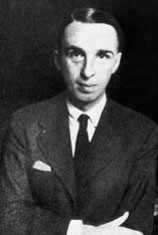 |
Georgy Ivanov Georgy Ivanov Georgii Vladimirovich Ivanov was a leading poet and essayist of the Russian emigration between the 1930s and 1950s.As a banker's son, Ivanov spent his young manhood in the elite circle of Russian golden youth. He started writing pretentious verses, imitative of Baudelaire and the French... (1894–1958) |
||
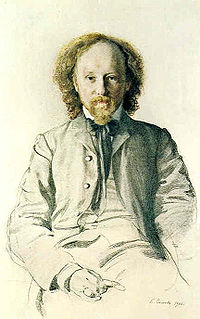 |
Vyacheslav Ivanov Vyacheslav Ivanovich Ivanov Vyacheslav Ivanovich Ivanov was a Russian poet and playwright associated with the Russian Symbolist movement. He was also a philosopher, translator, and literary critic.-Early life:... (1866–1949) |
Complaint Your soul, born deaf and blind, inhabits Jungles of sunless reverie, Where with the crash of trampled saplings Wild droves of dark desires roam free. A torch I kindled in the darkness To lead you to my starry gate, With seeds of light in shining handfuls The furrows of your night to sate. I stand amid the trackless stretches And hail you in the wilderness; But lost in dark and dreary caverns My cry sinks silent, answerless. |
|
| Ryurik Ivnev Ryurik Ivnev Rurik Ivnev was a Russian poet, novelist and translator.-Early years:Rurik Ivnev was born into a nobleman's family in Tiflis . His father, A. S. Kovalyov, a captain of a Russian army. The children had been brought up by their mother, A. P. Kovalyova-Prince. Among her ancestors was a Dutch count,... (1891–1981) |
K
| Portrait | Person | Notable works | Sample |
|---|---|---|---|
| Gavril Kamenev Gavril Kamenev Gavril Petrovich Kamenev was a Russian poet, writer, and translator.Kamenev was born on February 3, 1772, in Kazan and lived there in adverse circumstances , his only bright moments being brief visits to Moscow... (1772–1803) |
|||
| Antiochus Kantemir (1708–1744) |
|||
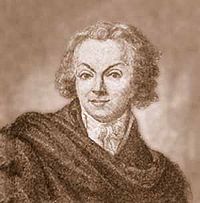 |
Vasily Kapnist Vasily Kapnist Count Vasily Vasilievich Kapnist , , was a Russian poet and playwright who wrote in somewhat rough Russian language.... (1758–1823) |
On Julia's Death The evening darkness shrouds The slumbering world in peace, And from her throne of clouds Shines Luna through the trees. My thoughts in silence blend. But gathered all to thee: Thou moon! the mourner's friend, Oh, come and mourn with me! Upon her grave I bow, The green grave where she lies: Oh, hear my sorrows now, And consecrate my sighs! This is her ashes' bed,— Here her cold relics sleep,— Where I my tears shall shed. While this torn heart can weep. O Julia! Never rose Had half the charms of thee! My comfort, my repose,— Oh, thou wert all to me I But thou art gone, and I Must bear life's load of clay,— And pray, and long to die, Though dying day by day. But I must cease to sing. My lyre all mute appears. Alas! Its plaintive string Is wetted with my tears. Oh! Misery's song must end,— My thoughts all fly to thee: Thou moon! The mourner's friend, Oh, come and mourn with me! |
|
| Rimma Kazakova Rimma Kazakova Rimma Fyodorovna Kazakova was a Soviet/Russian poet. She was known as an author of many popular songs of the Soviet era.She graduated from the history department of Leningrad State University. She worked as a lecturer in Khabarovsk.... (1932-2008) |
|||
| Dmitri Kedrin Dmitri Kedrin -External links:*... (1907–1945) |
|||
| Bakhyt Kenjeev Bakhyt Kenjeev Bakhyt Shkurullaevich Kenjeev is a Russian poet.-Life:In 1953 his parents moved to Moscow. He graduated from Lomonosov Moscow State University with a degree in chemistry... (born 1950) |
|||
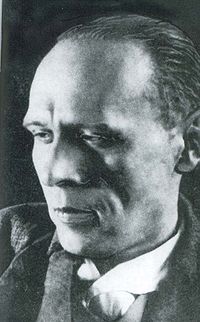 |
Daniil Kharms Daniil Kharms Daniil Kharms was an early Soviet-era surrealist and absurdist poet, writer and dramatist. One of his pseudonyms, which was signed in Latin alphabet, was Daniel Charms.- Life :... (1905–1942) |
||
| Ivan Khemnitser Ivan Khemnitser Ivan Ivanovitch Chemnitzer or Khemnitzer was a Russian fabulist, born at Yenotayevsk, Astrakhan, the son of a German physician of Chemnitz, who had served in the Russian army under Peter the Great. He participated in the campaigns of the Seven Years' War and afterward devoted himself to mining... (1745-1784) |
The Lion's Council of State A lion held a court for state affairs: Why? That is not your business, sir, 'twas theirs! He called the elephants for counsellors—still The council-board was incomplete; And the king deemed it fit With asses all the vacancies to fill. Heaven help the state—for lo! the bench of asses The bench of elephants by far surpasses. He was a fool, the foresaid king, you'll say: Better have kept those places vacant surely, Than fill them up so poorly. O no! that's not the royal way; Things have been done for ages thus,— and we Have a deep reverence for antiquity: Naught worse, sir, than to be, or to appear Wiser and better than our fathers were. The list must be complete, even though you make it Complete with asses; for the lion saw Such had for ages been the law,— He was no radical to break it! "Besides," he said, "my elephants' good sense Will soon my asses' ignorance diminish, For wisdom has a mighty influence." They made a pretty finish! The asses' folly soon obtained the sway: The elephants became as dull as they! |
||
| Velemir Khlebnikov (1885–1922) |
|||
| Vladislav Khodasevich Vladislav Khodasevich Vladislav Felitsianovich Khodasevich was an influential Russian poet and literary critic who presided over the Berlin circle of Russian emigre litterateurs.... (1886–1939) |
The Cork O cork that stoppered the strong iodine, How rapidly you rotted quite away! Thus is the body quietly consumed, Burnt by the soul, unseen, day after day. |
||
| Aleksey Khomyakov Aleksey Khomyakov Aleksey Stepanovich Khomyakov was a Russian religious poet who co-founded the Slavophile movement along with Ivan Kireyevsky, and became one of its most distinguished theoreticians.... (1804–1860) |
|||
| Dmitry Khvostov Dmitry Khvostov Count Dmitry Ivanovich Khvostov , was a Russian poet, representing the late period of classicism in Russian literature. Count Khvostov, as he was widely known, was an exceedingly prolific author of poems, fables, epigrams, etc, invariably archaic and pompous, making him an easy target for... (1757–1835) |
|||
| Semyon Kirsanov (1906–1972) |
|||
| Nikolay Klyuev (1884–1937) |
A Northern Poem Sunset dreams on fir-tree cones, Green the hedge, and brown the field; Mossy rifts in weathered stones Meekly vernal waters yield. Oh, look up the wooded steep God has touched it with his palm; Piously wild berries weep, listening to the grassy psalm. And I feel no fleshly tie; And my heart's a springing mead. Come, ye pilgrims white and shy, Peck the early wheaten seed. Tender evening twilight searches Cottage windows, gabled byres, And the leaves of slender birches Glimmer soft as wedding fires. |
||
| Pavel Kogan (1918–1942) |
|||
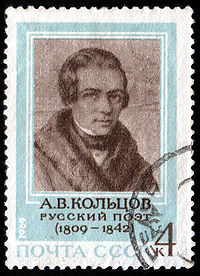 |
Aleksey Koltsov Aleksey Koltsov Aleksey Vasilievich Koltsov was a Russian poet who has been called a Russian Burns. His poems, frequently placed in the mouth of women, stylize peasant-life songs and idealize agricultural labour.... (1809–1842) |
An Old Man's Song I shall saddle a horse, A swift courser, he, I shall fly, I shall rush, As the hawk is keen, Over fields, over seas, To a distant land. I shall overtake there My young youth again. I shall make myself spruce Be a blade again, I shall make a fine show For the girls again. But alas! no road leads To the past we've left, And the sun will not rise For us in the west. |
|
| Nahum Korzhavin (born 1925) |
|||
| Ivan Kozlov Ivan Kozlov Ivan Ivanovich Kozlov was a Russian Romantic poet and translator. As D. S. Mirsky noted, "his poetry appealed to the easily awakened emotions of the sentimental reader rather than to the higher poetic receptivity".... (1779–1840) |
|||
| Vasili Krasovsky Vasili Krasovsky Vasili Ivanovich Krasovsky was a Russian writer.Krasovsky studied at the gymnasium of the Imperial Academy of Sciences in St. Petersburg, after which he worked for the body overseeing the Russian mining industry. From 1804 through 1813 Krasovsky was the secretary of the St... (1782–1824) |
|||
| Aleksey Kruchenykh (1886–1968) |
|||
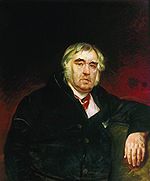 |
Ivan Krylov Ivan Krylov Ivan Andreyevich Krylov is Russia's best known fabulist. While many of his earlier fables were loosely based on Aesop and Jean de La Fontaine, later fables were original work, often satirizing the incompetent bureaucracy that was stifling social progress in his time.-Life:Ivan Krylov was born in... (1769–1844) |
A Swan, a Pike, and a Crab Whene'er companions don't agree, They work without accord; And naught but trouble doth result, Although they all work hard. One day a Swan, a Pike, a Crab, Resolved a load to haul. All three were harnessed to the cart, And pulled together all. But though they pulled with all their might, That cart-load on the bank stuck tight. The Swan pulled upwards to the skies, The Crab did backwards crawl, The Pike made for the water straight: This proved no use at all. Now, which of them was most to blame Tis not for me to say, But this I know—the load is there Unto this very day. |
|
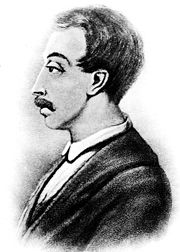 |
Wilhelm Küchelbecher (1797–1846) |
||
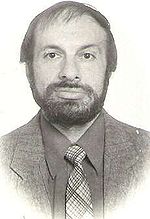 |
Anatoly Kudryavitsky Anatoly Kudryavitsky Anthony Kudryavitsky born in Moscow on 17 August 1954, better known by his pen name Anatoly Kudryavitsky , is a Russian-Irish novelist, poet and literary translator.-Biography:... (born 1954) |
||
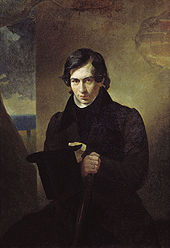 |
Nestor Kukolnik Nestor Kukolnik Nestor Vasilievich Kukolnik was a Russian playwright and prose writer of Carpatho-Rusyn origin. Immensely popular during the early part of his career, his works were subsequently dismissed as sententious and sentimental. Today, he is best remembered for having contributed to the libretto of the... (1809–1868) |
||
| Alexander Kushner Alexander Kushner Alexander Semenovich Kushner is a prominent Russian living poet from Saint Petersburg.- Biography :Kushner was born in Leningrad into a Russian-Jewish family; his father was a military engineer. He graduated from Herzen University, and later, between 1959 and 1969, taught Russian literature.... (born 1936) |
|||
 |
Dmitry Kuzmin Dmitry Kuzmin Dmitry Vladimirovich Kuzmin , born on December 12, 1968, is a Russian poet, critic, and publisher.-Biography:... (born 1969) |
||
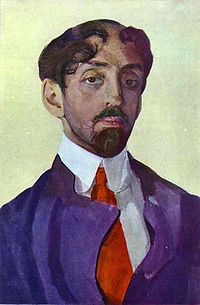 |
Mikhail Kuzmin (1872–1936) |
"Now Dry Thy Eyes" Now dry thy eyes, and shed no tears. In heaven's straw-pale meadows veers Aquarius, and earthward peers, His emptied vessel overturning. No storming snows, no clouds that creep Across the sheer pure emerald steep, Whence, thinly-drawn, a ray darts deep As a keen lance with edges burning. |
L
| Portrait | Person | Notable works | Sample |
|---|---|---|---|
| Vasily Lebedev-Kumach Vasily Lebedev-Kumach Vasily Ivanovich Lebedev-Kumach Moscow, — 20 February 1949) was a Soviet Russian poet and lyricist.He wrote numerous songs, the most famous being probably Священная война , Песня о Родине and Как много девушек хороших , later immortalized as the Argentine Tango song... (1898–1949) |
|||
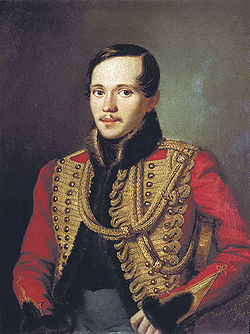 |
Mikhail Lermontov Mikhail Lermontov Mikhail Yuryevich Lermontov , a Russian Romantic writer, poet and painter, sometimes called "the poet of the Caucasus", became the most important Russian poet after Alexander Pushkin's death in 1837. Lermontov is considered the supreme poet of Russian literature alongside Pushkin and the greatest... (1814–1841) |
Borodino Borodino (poem) Borodino is a poem by Russian poet Mikhail Lermontov which describes the Battle of Borodino, the major battle of Napoleon's invasion of Russia... The Song of the Merchant Kalashnikov The Song of the Merchant Kalashnikov A Song about Tsar Ivan Vasilyevish, the Young Oprichnik, and the Valorous Merchant Kalashnikov, often abbreviated as The Song of the Merchant Kalashnikov, is a poem by Mikhail Lermontov written in 1837 and first published in 1838.... Demon Demon (poem) Demon is a poem by Mikhail Lermontov, written in several versions in the years 1829 to 1839. It is considered a masterpiece of European Romantic poetry.... Valerik Valerik (poem) "Valerik" is a war poem published in 1843 by the Russian Romantic writer Mikhail Lermontov.-The battle:The Battle of the Valerik River was fought on July 11, 1840, between the Imperial Russian Army and Chechen mountain tribesman, as part of the Russian conquest of the Caucasus.Mikhail Lermontov, a... Death of the Poet Death of the Poet "Death of the Poet" is an 1837 poem by Mikhail Lermontov, written in reaction to the death of Alexander Pushkin.Pushkin was mortally wounded in a duel on January 27, 1837, and died on the 29th... |
The Cup of Life We drink life's cup with thirsty lips, Our eyes shut fast to fears; About the golden rim there drips Our staining blood, our tears. But when the last swift hour comes on, The light long hid is lit, From startled eyes the band is gone, We suffer and submit. It is not our part to possess The cup that golden gleamed. We see its shallow emptiness: We did not drink we dreamed. |
| Mirra Lokhvitskaya Mirra Lokhvitskaya Mirra Lokhvitskaya was a Russian poet who rose to fame in the late 1890s and, due to the flamboyantly erotic sensuality of her works, was regarded as the "Russian Sappho" by her contemporaries... (1869–1905) |
And Moan of Winds... And moan of winds and whispered thoughts of gloom, From life no joy is won . . . Yet somewhere,—warmth, and ocean's muffled boom. And lustre of the sun. The blizzard wails, and in the heart it throws A load of tears unshed. Yet somewhere myrtle, verdant myrtle grows. And stainless roses spread. Life, passing by, in empty brooding delves, Unmeaning, unbedight . . . Yet somewhere, mirth and bliss will yield themselves, And comeliness and light! |
||
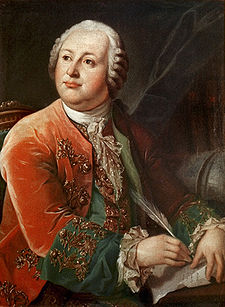 |
Mikhail Lomonosov Mikhail Lomonosov Mikhail Vasilyevich Lomonosov was a Russian polymath, scientist and writer, who made important contributions to literature, education, and science. Among his discoveries was the atmosphere of Venus. His spheres of science were natural science, chemistry, physics, mineralogy, history, art,... (1711–1765) |
||
| Vladimir Lugovskoy Vladimir Lugovskoy Vladimir Alexandrovich Lugovsky was a constructivist poet. In later years, his poetry became filled with imagery and emotion.-References:... (1901–1957) |
|||
| Eduard Limonov Eduard Limonov Eduard Limonov is Russian writer and political dissident, and is the founder and leader of radical National Bolshevik Party. An opponent of Vladimir Putin, Limonov is one of leaders of Other Russia political bloc.-Early life:... (born 1943) |
M
| Portrait | Person | Notable works | Sample |
|---|---|---|---|
| Osip Mandelstam Osip Mandelstam Osip Emilyevich Mandelstam was a Russian poet and essayist who lived in Russia during and after its revolution and the rise of the Soviet Union. He was one of the foremost members of the Acmeist school of poets... (1891–1938) |
Stalin Epigram Stalin Epigram The Stalin epigram, also known as The Kremlin Highlander is a satirical poem by the Russian Acmeist poet Osip Mandelstam, dated as being written in November 1933... |
"The Air Strikes Chill" The air strikes chill. Although transparent spring Has clothed Petropolis in pale green down, The Neva's waves are faintly sickening As if they were Medusa's coiling crown. On the embankment of our northern stream The fireflies of hurrying motors gleam. Steel dragonflies and beetles flit and whirr, And stars are pins of gold whose glitter pricks, But stars can never mortally transfix The heavy emerald of the sea water. |
|
| Anatoly Marienhof Anatoly Marienhof Anatoly Borisovich Marienhof or Mariengof 1897 — 24 April 1962) was a Russian poet, novelist and playwright. He was one of the leading figures of Imaginism. Now he is mostly remembered for his memoirs that depict Russian literary life of the 1920s and his friendship with Sergei Yesenin.- Biography... (1897–1962) |
"Savage, Nomad Hordes" Savage, nomad hordes Of Asia Poured fire out of the vats! Razin's execution is avenged, And Pugachov's pain Whose beard was torn away. Hooves Have broken The scruff of the earth, Cold with centuries, And the supernal sky, like a stocking With a hole in its heel Has been taken out of the laundry-trough Wholly clean. |
||
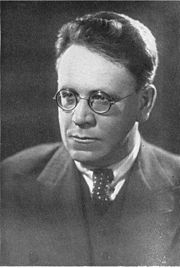 |
Samuil Marshak Samuil Marshak Samuil Yakovlevich Marshak was a Russian and Soviet writer, translator and children's poet. Among his Russian translations are William Shakespeare's sonnets, poems by William Blake and Robert Burns, and Rudyard Kipling's stories. Maxim Gorky proclaimed Marshak to be "the founder of [Russia's ]... (1887–1964) |
||
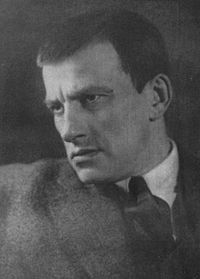 |
Vladimir Mayakovsky Vladimir Mayakovsky Vladimir Vladimirovich Mayakovsky was a Russian and Soviet poet and playwright, among the foremost representatives of early-20th century Russian Futurism.- Early life :... (1893–1930) |
Moonlit Night (A Landscape) There will be a moon. Already a bit of it shows. And now a full moon is hanging in the air. It must be that God is fishing about with a marvelous silver spoon in the star chowder. |
|
| Apollon Maykov Apollon Maykov Apollon Nikolayevich Maykov was a Russian poet.He was born into the artistic family of Nikolay Apollonovich Maykov, a painter and an academic. In 1834 the family moved to Petersburg. In 1837-1841 Maykov studied law at Saint Petersburg University. At first he was attracted to painting, but he soon... (1821–1897) |
The Alpine Glacier Dank the darkness on the cliff-side; Faintly outlined from below, In their modest maiden gladness, Glaciers in the dawn's blush glow. What new life upon me blowing, Breathes from yonder snowy height, From that depth of limpid turquoise Flashing in the morning light? There, I know, dread Terror dwelleth. Track of man there is not there; Yet my heart in answer swelleth To the challenge, "Come thou here!" |
||
 |
Dmitriy Merezhkovsky (1866–1941) |
The Curse of Love With heavy anguish, hopeless straining, The bonds of love I would remove. Oh, to be loosed from their enchaining! Oh, freedom, only not to love! The soul that shame and fear are scourging Crawls through a mist of dust and blood. From dust, great God, my spirit purging, Oh, spare me from love's bitter flood! Is pity's wall alone unshaken? I pray to God, I cry in vain, More weary, by all hope forsaken; Resistless love grows great again. There is no freedom, unforgiven, We live as slaves, by life consumed; We perish, tortured, bound and driven, Promised to death, and to love doomed. |
|
| Arvo Mets Arvo Mets Arvo Antonovich Mets was a Russian poet of Estonian ancestry. He was an expert of Russian free verse. He also translated works of Estonian poets.- Biography :... (1937–1997) |
|||
| Lev Mei (1822–1862) |
|||
| Alexander Mezhirov Alexander Mezhirov Alexander Petrovich Mezhirov was a Soviet and Russian poet, translator and critic.... (1923–2009) |
|||
| Sergey Mikhalkov Sergey Mikhalkov Sergey Vladimirovich Mikhalkov was a Soviet and Russian author of children's books and satirical fables who had the opportunity to write the lyrics of his country's national anthem on three different occasions, spanning almost 60 years.-Life and career:... (1913–2009) |
|||
| Nikolai Minsky Nikolai Minsky Nikolai Minsky and Nikolai Maksimovich Minsky are pseudonyms of Nikolai Maksimovich Vilenkin , a mystical writer and poet of the Silver Age of Russian Poetry.... (1855–1937) |
Force She lies, opening her teats, strong, swollen, wide, And at her breasts, their equal gift bestowing, Mad Nero and meek Buddha clutch, unknowing, As clinging twins who suckle side by side. She holds two vessels, whence, forever flowing, The streams of Life and Death serenely glide. She breathes and wreaths of stars are lit, and bide, She breathes anew: they fly like sere leaves blowing. She looks ahead with cold unseeing eyes; She cares not though she bear or cause to perish; The children whom she nurtures she will cherish, But when she weans them, every claim denies. Evil and Good gather them in thereafter And play the cosmic game with idle laughter. |
||
| Yunna Morits Yunna Morits Yunna Morits , is a Soviet and Russian artist of many talents primarily known as a poet, was born in Kiev, USSR in a Jewish family. Her father Pinchas Moritz, was imprisoned under Stalin, she suffered from tuberculosis in her childhood, and spent years of hardship in the Urals during WWII... (born 1937) |
N
| Portrait | Person | Notable works | Sample |
|---|---|---|---|
| Vladimir Nabokov Vladimir Nabokov Vladimir Vladimirovich Nabokov was a multilingual Russian novelist and short story writer. Nabokov wrote his first nine novels in Russian, then rose to international prominence as a master English prose stylist... (1899–1977) |
|||
| Semyon Nadson (1862–1887) |
"Pity the Stately Cypress Trees" Pity the stately cypress trees; How freshly green they spring! Ah! why amidst their branches, child, Have you put up your swing? Break not a single fragrant bough. Oh, take thy swing away To heights where thick acacias bloom; Mid dusty olives play! Thence you can see the Ocean, And, as your swing ascends, Through greening boughs a sunny glimpse The sea in laughter sends Of white sails in the distance dim, Of white gulls far away, Of white flakes foaming on the sands, A fringe of snowy spray. |
||
| Vladimir Narbut Vladimir Narbut Vladimir Ivanovich Narbut - Russian poet of Ukrainian descent, and member of the Acmeist group, brother of Ukrainian artist and graphic designer Georgy Narbut.-Biography:... (1888–1938) |
|||
| Sergey Narovchatov Sergey Narovchatov Sergey Narovchatov was a Russian author and editor-in-chief of the literary magazine Novy Mir from 1974 to 1981.-Works:*"Необычное литературоведение" [Unusual study of literature]... (1919–1981) |
|||
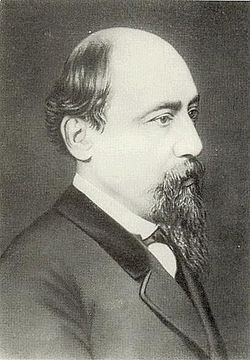 |
Nikolay Nekrasov Nikolai Alekseevich Nekrasov Nikolay Alexeyevich Nekrasov was a Russian poet, writer, critic and publisher, whose deeply compassionate poems about peasant Russia won him Fyodor Dostoyevsky's admiration and made him the hero of liberal and radical circles of Russian intelligentsia, as represented by Vissarion Belinsky and... (1821–1877) |
The Russian Soldier Then up there comes a veteran, With medals on his breast; He scarcely lives, but yet contrives To drink with all the rest. "A lucky man am I," he cries, And thus to prove the fact he tries. "In what consists a soldier's luck? Pray, listen while I tell. In twenty fights, or more, I've been, And yet I never fell. And, what is more, in peaceful times Full meal I never knew; Yet, all the same, I have contrived Not to give Death his due. Again, for sins both great and small, Full many a time they've me With canes unmercifully flogged, Yet I'm alive, you see!" |
|
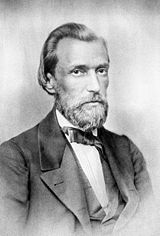 |
Ivan Savvich Nikitin Ivan Savvich Nikitin Ivan Savvich Nikitin Born in Voronezh into a merchant family, Nikitin was educated in a seminary until 1843. His father's violence and alcoholism brought the family to ruin and forced young Ivan to provide for the household by becoming an innkeeper... (1824–1861) |
Gossip Though blameless thy living As Anchorite's fate, Yet gossip will find thee Or early or late. Through keyhole he enters And stands at thy side, Doors of wood nor of stone Against him provide. He pulls the alarm bell At slightest excuse- And down to thy grave Will pursue with abuse. Self defence nothing boots thee, Thy flight he will worst- To earth he will tread thee, O Gossip be cursed! |
O
| Portrait | Person | Notable works | Sample |
|---|---|---|---|
| Alexander Odoevsky Alexander Odoevsky Alexander Ivanovich Odoevsky was a Russian poet and playwright, one of the leading figures of the 1825 Decembrist revolt... (1802–1839) |
The Ball | ||
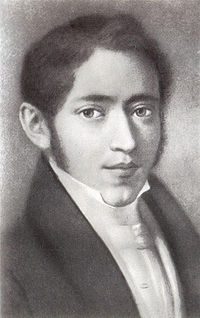 |
Nikolay Ogarev Nikolay Ogarev Nikolay Platonovich Ogarev , was a Russian poet, historian and political activist. He was deeply critical of the limitations of the Emancipation of the Serfs claiming that the serfs were not free but had simply exchanged one form of serfdom for another.Ogarev was a fellow-exile and collaborator of... (1813–1877) |
The Village Watchman The night is dark, and clouds abound, Appears the white snow everywhere; The crackling frost pervades the ground, And frigid is the atmosphere. On either side the long, broad street The peasants' cottages are seen; The solitary watchman's feet Are heard, as he moves on between. Cold is he now; the hollow gale Fills with violent blast the air; The frost has touched his visage pale, And whitened all his beard and hair. Joy has fled from his gloomy brow, He finds it hard to be alone; Through the dark night, and blinding snow, His song resounds with mournful tone. By moonless nights he paces late, Watching until the morn comes round; His hammer upon the iron plate Gives out a dreary, dismal sound. And swaying ever to and fro, The board prolongs its dreadful moan; The heart dies down with feelings low, And sorrow weighs it, lorn and lone. |
|
| Irina Odoyevtseva Irina Odoyevtseva Irina Vladimirovna Odoyevtseva was a Russian poet, novelist and author of memoirs... (1895–1990) |
|||
| Bulat Okudzhava Bulat Okudzhava Bulat Shalvovich Okudzhava was a Soviet and Russian poet, writer, musician, novelist, and singer-songwriter. He was one of the founders of the Russian genre called "author song"... (1924–1997) |
P
| Portrait | Person | Notable works | Sample |
|---|---|---|---|
| Valentin Parnakh Valentin Parnakh Valentin Yakovlevich Parnakh was a Russian poet, translator, choreographer, and musician who is best remembered as a founding father of Soviet jazz.- Early years :... (1891–1951) |
|||
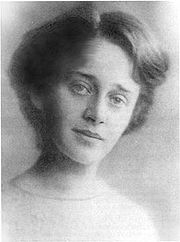 |
Sophia Parnok (1885–1933) |
||
| Boris Pasternak Boris Pasternak Boris Leonidovich Pasternak was a Russian language poet, novelist, and literary translator. In his native Russia, Pasternak's anthology My Sister Life, is one of the most influential collections ever published in the Russian language... (1890–1960) |
"The Drowsy Garden" The drowsy garden scatters insects Bronze as the ash from braziers blown. Level with me and with my candle, Hang flowering worlds, their leaves full-grown. As into some unheard-of dogma I move across into this night, Where a worn poplar age has grizzled Screens the moon's strip of fallow light, Where the pond lies, an open secret, Where apple bloom is surf and sigh, And where the garden, a lake dwelling, Holds out in front of it the sky. |
||
| Karolina Pavlova Karolina Pavlova Karolina Pavlova was a 19th century Russian poet and novelist who stood out from other writers on account of her unique appreciation of exceptional rhymes and imagery.-Biography:... (1807–1893) |
|||
| Vladimir Pecherin Vladimir Pecherin Father Vladimir Sergeyvich Pecherin , was a controversial Russian political figure both in nineteenth-century Ireland and in Russia... (1807–1885) |
|||
| Mariya Petrovykh Mariya Petrovykh Mariya Sergeevna Petrovykh was a Russian poet and translator.- Early life :... (1908–1979) |
|||
| Aleksey Plescheev Aleksey Plescheev Aleksey Nikolayevich Pleshcheyev was a radical Russian poet of the 19th century, one of the Petrashevsky Circle.Pleshcheyev's first book of poetry, published in 1846, made him famous: «Вперед! без страха и сомненья…» became widely known as "a Russian La Marseillaise" , «На зов друзей»... (1825–1893) |
Passion Ah! could I but utter in song All the anguish which robs me of peace, Thy sorrow of soul would be stilled, Thy murmur of doubting would cease! I would breathe forth my life, my beloved. As I told all my pain for thy sake; And, bursting in passionate song. My heart in its fulness would break. |
||
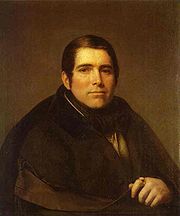 |
Pyotr Pletnyov Pyotr Pletnyov Pyotr Alexandrovich Pletnyov was a minor Russian poet and literary critic, who rose to become the dean of the Saint Petersburg University and academician of the Petersburg Academy of Sciences .... (1792–1866) |
||
| Elizaveta Polonskaya Elizaveta Polonskaya Elizaveta Grigorevna Polonskaya , born Movshenson, was a Russian Jewish poet, translator, and journalist, the only female member of the Serapion Brothers.-Early life:... (1890-1969) |
|||
| Yakov Polonsky Yakov Polonsky Yakov Petrovich Polonsky was a leading Pushkinist poet who tried to uphold the waning traditions of Russian Romantic poetry during the heyday of realistic prose.... (1819–1898) |
A Gipsy Song Pile of embers in the darkness, Sparks expire as they fly Night conceals us from the passing, On the bridge we'll say good-by! At the parting, shawl of crimson Cross my shoulders thou shalt lace, At an end the days swift passing, Met within this shaded place. In the morning, with first splendour. All my life compelled to rove I shall leave with other gipsies Seeking happiness and love. How does fate foretell my future? Who, to-morrow by my side, O'er my heart will loose with kisses Knots by thy dear hand fast tied? Flash of embers in the darkness, Sparks expire as they fly Night conceals us from the passing, On the bridge we'll kiss good-by! |
||
| Nikolay Popovsky Nikolay Nikitich Popovsky Nikolay Nikitich Popovsky was a Russian poet and protege of Mikhail Lomonosov. Son of a priest serving at Saint Basil's Cathedral in Moscow, in 1748 he was chosen by Vasily Trediakovsky at Lomonosov's behest amongst ten students from the Moscow Slavyano-Greko-Latin Academy to be enrolled in the... (1730–1760) |
|||
| Vasili Popugaev Vasili Popugaev Vasili Vasilyevich Popugaev was a Russian poet, novelist, and translator. He was one of the leaders of the Free Society of Lovers of Literature, Science, and the Arts.-Life:... (1778 or 1779 – c. 1816) |
|||
| Alexander Prokofyev Alexander Prokofyev Alexander Andreyevich Prokofyev was a Soviet poet. Prokofyev is best recognized for the motifs of Russian folklore found in his works.-Biography:... (1900–1971) |
|||
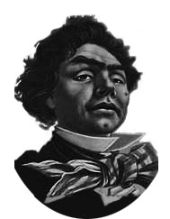 |
Kozma Prutkov Kozma Prutkov Kozma Petrovich Prutkov is a fictional author invented by Aleksey Konstantinovich Tolstoy and his cousins, three Zhemchuzhnikov brothers, Alexei, Vladimir and Alexander, during the later part of the rule of Nicholas I of Russia.... (1817–1875) |
||
 |
Alexander Pushkin (1799–1837) |
Eugene Onegin Eugene Onegin Eugene Onegin is a novel in verse written by Alexander Pushkin.It is a classic of Russian literature, and its eponymous protagonist has served as the model for a number of Russian literary heroes . It was published in serial form between 1825 and 1832... |
From Eugene Onegin Lensky and Olga Sometimes he read aloud with Olga A latter day romance discreet, Whose author truly painted nature, With cunning plot, insight complete; Oft he passed over a few pages, Too bald or tasteless in their art And coloring, began on further, Not to disturb the maiden heart. Again, they sat for hours together, With but a chess board to divide She with her arms propped on the table, Deep pondering, puzzled to decide Till Lensky from his inward storm Captured her castle with his pawn! |
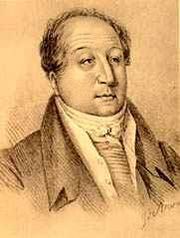 |
Vasily Pushkin Vasily Pushkin Vasiliy Lvovich Pushkin was a minor Russian poet best known as an uncle of the much more famous Alexander Pushkin.... (1766–1830) |
R
| Portrait | Person | Notable works | Sample |
|---|---|---|---|
| Vladimir Raevsky Vladimir Raevsky Vladimir Fedoseyevich Rayevsky was a Russian poet who participated in the Patriotic war of 1812.After the war, when living in Tiraspol, he became a leading member of the Southern Society of Decembrists. The world's only known statue of him is located in Tiraspol.... (1795–1872) |
|||
 |
Irina Ratushinskaya Irina Ratushinskaya Irina Borisovna Ratushinskaya is a prominent Russian dissident, poet and writer.Irina was educated at Odessa University, the city of her birth, and was graduated with a Master's Degree in physics in 1976... (born 1954) |
||
| Yevgeny Rein Yevgeny Rein Yevgeny Borisovich Rein is a Russian poet and writer. His poetry won the State Prize of Russia , Pushkin Prize of Russia, and Tsarskoe Selo Art Prize .... (born 1935) |
|||
| Yevdokiya Rostopchina Yevdokiya Rostopchina Yevdokia Petrovna Rostopchina, was one of the early Russian women poets.After losing her mother at the age of six, Yevdokia Sushkova grew up in Moscow in the family of her maternal grandfather, Ivan Alexandrovich Pashkov... (1812–1858) |
|||
| Konstantin Romanov Grand Duke Constantine Constantinovich of Russia Grand Duke Constantine Constantinovich of Russia was a grandson of Emperor Nicholas I of Russia, and a poet and playwright of some renown... (K.R.) (1858–1915) |
Love's Reason Why For beauty love me not! Nor love for gold! For beauty—love the Day— For wealth—love coinage cold! Nor love me for my youth! For Youth—love spring! But love—because to you With constant love I cling. |
||
| Vsevolod Rozhdestvensky Vsevolod Rozhdestvensky Vsevolod Alexandrovich Rozhdestvensky was a Russian poet.... (1895–1977) |
|||
| Robert Rozhdestvensky Robert Rozhdestvensky Robert Ivanovich Rozhdestvensky was a Soviet poet who in the broke with the Social Realism in 1950s–1960s and, along with such poets as Andrey Voznesensky, Yevgeny Yevtushenko, and Bella Akhmadulina, pioneered a newer, fresher, and freer poetry in the Soviet Union.-Life:Robert Rozhdestvensky... (1932–1994) |
|||
| Nikolay Rubtsov Nikolay Rubtsov Nikolay Mikhaylovich Rubtsov was a Russian poet.He was killed by the woman with whom he spent the last one and a half years of his life.Asteroid 4286 Rubtsov was named after him.-External links:* *... (1936–1971) |
|||
 |
Kondraty Ryleyev (1795–1826) |
S
| Portrait | Person | Notable works | Sample |
|---|---|---|---|
| David Samoylov David Samoylov David Samoylov , pseudonym of David Samuilovich Kaufman . He is a notable poet of War generation of Russian poets, and considered one of the most important Russian poets of the post-World War II era.-External links:* * *... (1920–1990) |
|||
| Genrikh Sapgir Genrikh Sapgir Genrikh Sapgir was a Russian poet and fiction writer.-Biography:He was born in Biysk to a family of a Moscow engineer on a business trip. The family returned to Moscow fairly soon.... (1928–1999) |
|||
| Mikhail Savoyarov Mikhail Savoyarov Mikhail Savoyarov is a Russian chansonnier, composer, poet, comic actor and mime. In the first quarter of 20th century he was a famous satirical singer-songwriter. His popularity peak was in the years of war when he began to be called the King of eccentrics. It was also the time when he became... (1876–1941) |
|||
| Ilya Selvinsky Ilya Selvinsky Ilya Selvinsky was a Russian poet, and known leader of the Constructivist movement; as such, he implemented "a scientific approach into the realm of poetry."... (1899–1968) |
|||
| Igor Severyanin Igor Severyanin Igor Severyanin was a Russian poet who presided over the circle of the so-called Ego-Futurists.Igor was born in St. Petersburg in the family of an army engineer. Through his mother, he was remotely related to Nikolai Karamzin and Afanasy Fet. In 1904 he left for Manchuria with his father but later... (1887–1941) |
A Russian Song Lace and roses in the forest morning shine, Shrewdly the small spider climbs his cobweb line. Dews are diamonding and blooming faery-bright. What a golden air ! What beauty ! Oh, what light ! It is good to wander through the dawn-shot rye, Good to see a bird, a toad, a dragon-fly; Hear the sleepy crowing of the noisy cock, And to laugh at echo, and to hear her mock. Ah, I love in vain my morning voice to hurl, Ah, off in the birches, but to glimpse a girl, Glimpse, and leaning on the tangled fence, to chase Dawn's unwilling shadows from her morning face. Ah, to wake her from her half-surrendered sleep, Tell her of my new-sprung dreams, that lift and leap, Hug her trembling breasts that press against my heart, Stir the morning in her, hear its pulses start. |
||
| Varlam Shalamov Varlam Shalamov Varlam Tikhonovich Shalamov , baptized as Varlaam, was a Russian writer, journalist, poet and Gulag survivor.-Early life:Varlam Shalamov was born in Vologda, Vologda Governorate, a Russian city with a rich culture famous for its wooden architecture, to a family of a hereditary Russian Orthodox... (1907–1982) |
|||
| Shchepkina-Kupernik (1874–1952) |
|||
| Stepan Shchipachev Stepan Shchipachev Stepan Shchipachev was a Russian poet. He is best known for the poem Lines of Love and the collections Musings , A Man's Hand , and Selected Works .-References:*... (1889–1980) |
Sunflower The sunflower has nowhere to shelter from the rain his feet in mud, the water between the beds won't drain. Capped, carroty and freckled, you see the chap remain fast in the bed why should he run? He likes the rain. |
||
| Vadim Shefner Vadim Shefner Vadim Sergeevich Shefner Вадим Сергеевич Шефнер was a Soviet and Russian poet and writer who started publishing poetry in 1936. His first poetry collection was published in 1940. He turned to philosophical science fiction in the early 1960s, but continued publishing non-genre fiction and... (1915–2002) |
|||
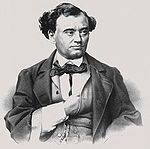 |
Nikolay Sherbina Nikolay Sherbina Nikolay Fyodorovich Shcherbina - Russian poet of 19th century.Nikolay Shcherbina was born on December 2, 1821 in Mius district of Don Cossack Host in the mansion of his mother. His father was of Ukrainian descent, and his mother of Greek descent. The parents of Shcherbina moved into the city of... (1821–1869) |
Earth Do you remember, dear-or care? When I was but a little thing, Among the garden-blossoms, there, I brushed a bee and took its sting: My finger pained me. Quick and hot, My tears ran like a rivulet. You laid upon the aching spot A lump of brown earth, cool and wet… And, all at once, there was no pain! And you looked on, with your kind eyes, To see me at my sport, again, Of chasing dappled butterflies. That time is long and long since flown; But I received a later dart… Oh, my dear friend, to you I own, It is Love’s shaft within my heart! So be it!-now I only crave The perfect cure that with you lies- A little cool earth from your grave Above this heart, upon these eyes. |
|
| Vadim Shershenevich Vadim Shershenevich Vadim Gabrielevich Shershenevich was a Russian poet.-Earlier years:Shershenevich was born in Kazan, Russia on 25 January 1893 . He was the son of professor of Law Gabriel Feliksovich Shershenevich, a Polish national and a deputy of the first State Duma from the Constitutional Democratic party and... (1893–1942) |
|||
 |
Stepan Shevyryov Stepan Shevyryov Stepan Petrovich Shevyryov was a Russian poet, translator, literary critic and philologist... (1806–1864) |
||
| Maria Shkapskaya Maria Shkapskaya -Early life:Maria was born in Saint Petersburg in 1891, the youngest of 5 children. Her parents were educated and cultured, but the family struggled financially, depending on her father's small pension. Her mother suffered from paralysis and her father had retired from a minor government position... (1891-1952) |
No Dream | ||
| Gennady Shpalikov Gennady Shpalikov Gennady Fyodorovich Shpalikov was a Soviet Russian poet and a screenwriter.Born in the town of Segezha, he moved to Moscow with his parents in 1939. In the fall of 1941, he was evacuated to the Kirghiz SSR, together with the Academy of Military Engineers, where his father, Fyodor Grigorievich... (1937–1974) |
|||
| Konstantin Simonov Konstantin Simonov Konstantin Mikhailovich Simonov was a Russian/Soviet author, known especially as a war poet.-Early years:He was born in Petrograd. His mother was born Princess Obolenskaya, of a Rurikid family. His father, an officer in the Tsar's army, left Russia after the Revolution in 1917. He died in Poland... (1915–1979) |
Wait for Me | Wait For Me (1941) Just wait for me and I'll return. But wait, oh, wait with all your might. . . Wait when your heart is saddened by The pouring rains, the sallow light. Wait when the wind heaps up the snow, Wait when the air is dry and hot. Wait when the rest no longer wait For those whom they too soon forgot. Wait when the letters fail to come, Wait on, through dread and through despair, When those who wait together end Their waiting and turn otherwhere. Just wait for me and I'll return. And show no kindliness to such As know by heart that it is time To cease from grieving overmuch. Let both my mother and my son Believe me lost, let friends who tire Of waiting longer sit them down Barren of hope beside the fire, And let them toast my memory In bitter wine as friends will do. Wait while they drink, be waiting still, Nor lift the glass they pour for you. Just wait for me and Til return, To spite all deaths that men can die. Let those who gave up waiting say: "It was his luck"-that is a lie. It is not theirs to understand Who gave up waiting, wearily. How under fire I was safe, Since, waiting, you protected me. And none but you and I will know How I escaped the thrust of fate- Simply because, better than all The others, you knew how to wait. |
|
| Stepan Skitalets Stepan Skitalets Stepan Skitalets , , was the pen-name of Stepan Gavrilovich Petrov, a Russian/Soviet poet, writer of fiction and folk musician. The name Skitalets means "wanderer" in Russian.- Early life :... (1869–1941) |
Recited at a charity event, 1902. A shadow falls upon your heads, You will not like my song; The emptiness inside you spreads- It will not spread for long. Of you, the world has had enough, The years will soon be free Of you, and made of finer stuff- Life waits for men like me. |
||
| Konstantin Sluchevsky Konstantin Sluchevsky Konstantin Konstantinovich Sluchevsky , was a Russian poet.-Biography:Sluchevsky was born in St. Peterburg into a Russian noble family. He graduated from the First Cadet Corps, served in the Imperial Russian Guard, then entered the Academy of the General Staff, but in 1861 he quit the military... (1837–1904) |
|||
 |
Boris Slutsky Boris Slutsky Boris Slutsky was a Soviet poet of Russian language.Lived his childhood and youth in Harkov. In the year 1937 entered the law institute of Moscow, and since1939 studied also at the Institute of literature "Maxim Gorky" till 1941.... (1919–1986) |
||
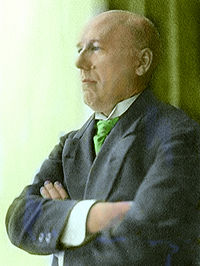 |
Fyodor Sologub Fyodor Sologub Fyodor Sologub was a Russian Symbolist poet, novelist, playwright and essayist. He was the first writer to introduce the morbid, pessimistic elements characteristic of European fin de siècle literature and philosophy into Russian prose.-Early life:... (1863–1927) |
The Amphora In a gay jar upon his shoulder The slave morosely carries wine. His road is rough with bog and boulder, And in the sky no starlights shine. Into the dark with stabbing glances He peers, his careful steps are slow, Lest on his breast as he advances The staining wine should overflow. I bear my amphora of sorrow, Long brimming with the wine it hides; There poison for each waiting morrow Ferments within the painted sides. I follow secret ways and hidden To guard the evil vessel, lest A careless hand should pour unbidden Its bitterness upon my breast. |
|
| Vladimir Soloukhin Vladimir Soloukhin Vladimir Alexeyevich Soloukhin was a Russian poet and writer. Born in Alepino, a village in what is now Vladimir Oblast, he was raised in a peasant family.Soloukhin was educated in a mechanical technicum, where he studied to be a mechanic.... (1924-1997) |
|||
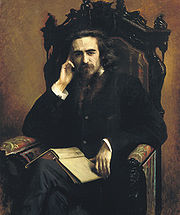 |
Vladimir Solovyov Vladimir Solovyov (philosopher) Vladimir Sergeyevich Solovyov was a Russian philosopher, poet, pamphleteer, literary critic, who played a significant role in the development of Russian philosophy and poetry at the end of the 19th century... (1853–1900) |
"Below the Sultry Storm" Below the sultry storm that seemed to lower, An alien force, again I heard the call Of my mysterious mate: the prisoned power Of old dreams flared and flickered in its fall. And with a cry of horror and of dolor- As of an eagle in an iron vise- My spirit shook its cage in quivering choler, And tore the net, and issued to the skies. And up behind the clouds, unswerving, bearing,- Before the miracles a flaming sea- Within the shining sanctum briefly flaring, It vanished into white infinity. |
|
| Alexander Sumarokov Alexander Sumarokov Alexander Petrovich Sumarokov was a Russian poet and playwright who single-handedly created classical theatre in Russia, thus assisting Mikhail Lomonosov to inaugurate the reign of classicism in Russian literature.... (1717–1777) |
|||
| Ivan Surikov Ivan Surikov Ivan Zakharovich Surikov was a self-taught peasant poet, best known for his folklore-influenced ballads, some of which were put to music by well-known composers , while some became real folk songs.-Biography:Ivan Surikov was born in Novosyolovo village near Uglich, son of Zakhar Adrianovich... (1841–1880) |
Rowan Steppe |
||
| Mikhail Svetlov Mikhail Arkadyevich Svetlov Mikhail Arkadyevich Svetlov , born Scheinkman , was a Soviet Russian poet.-Biography:Svetlov was born into a poor Jewish family. He has been published since 1917. A member of Komsomol since 1919, Svetlov was sent to the First Congress of Proletarian Writers in Moscow in 1920 and took part in the... (1903–1964) |
T
| Portrait | Person | Notable works | Sample |
|---|---|---|---|
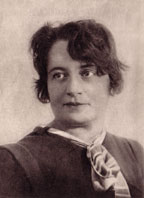 |
Yelizaveta Tarakhovskaya Yelizaveta Tarakhovskaya Yelizaveta Yakovlevna Tarakhovskaya was a Russian poet, playwright, translator, and author of children's books.-Biography:Yelizaveta Tarakhovskaya was born in the city of Taganrog on July 26, 1891 in a pharmacist's family. She is sister to poetess Sophia Parnok and twin sister to founder of... (1891–1968) |
||
| Arseny Tarkovsky Arseny Tarkovsky Arseny Alexandrovich Tarkovsky was a prominent Soviet and Russian poet and translator. He is considered one of the great 20th century Russian poets. He was also the father of influential film director Andrei Tarkovsky.-Origin:... (1907–1989) |
|||
| Nikolay Tikhonov Nikolay Semenovich Tikhonov Nikolai Semenovich Tikhonov - a Soviet writer, a member of the Serapion Brothers literary group.-Biography:... (1896–1979) |
Our Rooms Our rooms are turned to rolling wagons With wheels that creak on roads of air; And down below, the moony water Is playing gently with green hair. We travel over crystal bridges, Across the earth, across the sky. Its red cheek pressed against our windows, The sun sings out as we roll by. And every heart's a summer beehive Blazing with a dark honeyed gleam, As though we were the lucky first ones To bend our heads above the stream. We do not know who leads us onward, What end our hurrying wheels will find, But, like a bird set free, the spirit Darts on a wing that rips the wind. |
||
| Aleksey Tolstoy Aleksey Konstantinovich Tolstoy Count Aleksey Konstantinovich Tolstoy, often referred to as A. K. Tolstoy , was a Russian poet, novelist and playwright, considered to be the most important nineteenth-century Russian historical dramatist... (1817–1875) |
My Little Almond Tree My little almond tree Is gay with gleaming bloom, My heart unwillingly Puts forth its buds of gloom. The bloom will leave the tree, The fruit, unbidden, grow. And the green boughs will be By bitter loads brought low. |
||
| Vasily Trediakovsky (1703–1769) |
|||
| Marina Tsvetaeva Marina Tsvetaeva Marina Ivanovna Tsvetaeva was a Russian and Soviet poet. Her work is considered among some of the greatest in twentieth century Russian literature. She lived through and wrote of the Russian Revolution of 1917 and the Moscow famine that followed it. In an attempt to save her daughter Irina from... (1892–1941) |
"No Longer Now" No longer now the same god-given bounties Where now no longer the same waters glide. Then fly, and hasten, doves of Aphrodite, Through the great gates that sunset has swung wide. And I on the chill sands shall lie, receding Into the dimness of unreckoned days . . . Like the shed skin the snake is coldly eyeing, My youth, outgrown, has shrunk under my gaze. |
||
| Ivan Turgenev Ivan Turgenev Ivan Sergeyevich Turgenev was a Russian novelist, short story writer, and playwright. His first major publication, a short story collection entitled A Sportsman's Sketches, is a milestone of Russian Realism, and his novel Fathers and Sons is regarded as one of the major works of 19th-century... (1818–1883) |
|||
| Veronika Tushnova Veronika Tushnova Veronika Mikhailovna Tushnova was a Soviet poet and member of the USSR Union of Writers.-Biography:Tushnova graduated from high school where she had pursued advanced studies of foreign languages... (1915-1965) |
Memory of the Heart | ||
 |
Aleksandr Tvardovsky Aleksandr Tvardovsky Aleksandr Trifonovich Tvardovsky was a Soviet poet, chief editor of Novy Mir literary magazine from 1950 to 1954 and 1958 to 1970... (1910–1971) |
The Starling On the porch a trooper marvels At a starling: "Take my word, There is something to that fellow, Yes, a starling's quite a bird. "In this scorched and blistered garden That's attached to our new base, All day long the chap is busy, Keeps at work about the place; "He's rebuilding, he's repairing. Just as if to signify: War or no war, still the thing is To increase and multiply." |
|
 |
Fyodor Tyutchev Fyodor Tyutchev Fyodor Ivanovich Tyutchev is generally considered the last of three great Romantic poets of Russia, following Alexander Pushkin and Mikhail Lermontov.- Life :... (1803–1873) |
Silentium Be silent, hidden, and conceal Whate'er you dream, whate'er you feel. Oh, let your visions rise and die Within your heart's unfathomed sky, Like stars that take night's darkened route. Admire and scan them and be mute. The heart was born dumb; who can sense Its tremors, recondite and tense? And who can hear its silent cry? A thought when spoken is a lie. Uncovered springs men will pollute, Drink hidden waters, and be mute. Your art shall inner living be. The world within your fantasy A kingdom is that waits its Saul. The outer din shall still its call, Day's glare its secret suns confute. Oh, quaff its singing, and be mute. |
U
| Portrait | Person | Notable works | Sample |
|---|---|---|---|
| Vladimir Uflyand Vladimir Uflyand Vladimir Uflyand was a Russian poet, famous for such poems as It has For Ages Been Observed; Now, At Last, Even Nikifor's A Suitor; The Peasant; and The Working Week Comes To An End.... (1937–2007) |
|||
| Joseph Utkin Iosif Utkin Iosif Pavlovich Utkin was a Russian poet of the World War II generation.Utkin was born on 13 May at the Khingan station of the Chinese Eastern Railway, which his parents were helping to construct. After his birth the family returned to their native city Irkutsk, where the future poet lived until... (1903–1944) |
The Story About Ginger Motele Mr. Inspector Rabbi Isaiah and Commissar Bloch |
V
| Portrait | Person | Notable works | Sample |
|---|---|---|---|
 |
Konstantin Vaginov Konstantin Vaginov Konstantin Konstantinovich Vaginov was a Russian poet and novelist. In twenties he was a member of almost all the poetic groups of Saint Petersburg. In 1921 he joined Nikolai Gumilyov's Guild of Poets.... (1899–1934) |
||
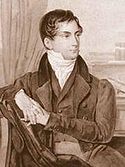 |
Dmitry Venevitinov Dmitry Venevitinov Dmitry Vladimirovich Venevitinov was a minor Russian Romantic poet who died at the age of 21, carrying with him one of the greatest hopes of Russian literature.... (1805–1827) |
||
| Igor Vishnevetsky Igor Vishnevetsky Igor Georgievich Vishnevetsky is a notable Russian poet. He has been a contributor and editor in numerous Russian literary journals and anthologies since the 1980s... (born 1964) |
|||
 |
Dmitry Vodennikov Dmitry Vodennikov Dmitry Vodennikov is a Russian poet and essayistIn 2002, he was named as one of the ten best living Russian poets in a poll of 110 leading Russian poets and critics, being one of just two poets under 35 in the top ten. Some critics name him as "perhaps the best known poet of his generation",... (born 1968) |
||
 |
Maksimilian Voloshin (1877–1932) |
Stigmata Whose the flying hands, about me shedding Fire, and leading me on passionate ways? No sonorous stones my feet are treading, But where vatic waters fill the days. Piercing through the spirit, sharp pilasters Rise, and candle sting the dark like bees. Oh, the hearts that bloom like crimson asters, Petalled with gold-bladed ecstasies. Now the evening on the temple flinging Patterned, carven crimson, shines and mourns. Oh, the pale brow to the altar clinging, Stung anew with stinging scarlet thorns! The whole soul, high vaults and portals glowing, Fear like incense swathes with dim blue bands: Ah, I know you, sacred corals, growing On the pierced palms of these outstretched hands. |
|
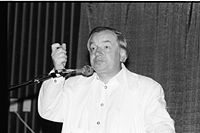 |
Andrey Voznesensky Andrey Voznesensky Andrei Andreyevich Voznesensky was a Soviet and Russian poet and writer who had been referred to by Robert Lowell as "one of the greatest living poets in any language." He was one of the "Children of the '60s," a new wave of iconic Russian intellectuals led by the Khrushchev Thaw.Voznesensky was... (1933–2010) |
||
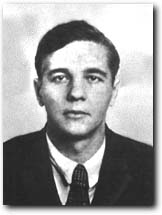 |
Alexander Vvedensky (1904–1941) |
||
| Pyotr Vyazemsky Pyotr Vyazemsky Prince Pyotr Andreyevich Vyazemsky or Petr Andreevich Viazemsky was a leading personality of the Golden Age of Russian poetry.- Biography :... (1792–1878) |
Spring "Ah, Spring, sweet Spring, chief pride of Nature!" The air is foul, the ground is sludge; Men curse the mud when they go walking, And plunged in muck, a horse can't budge. The cab breaks down, so does the carriage; Season of colds in chest and nose, To you, fair Spring, is reverence tendered By cartwrights and by medicos. |
||
| Vladimir Vysotsky Vladimir Vysotsky Vladimir Semyonovich Vysotsky was a Soviet singer, songwriter, poet, and actor whose career had an immense and enduring effect on Russian culture. He became widely known for his unique singing style and for his lyrics, which featured social and political commentary in often humorous street... (1938–1980) |
Y
| Portrait | Person | Notable works | Sample |
|---|---|---|---|
| Pyotr Yakubovich Pyotr Yakubovich Pyotr Filippovich Yakubovich was a was a Russian revolutionary, revolutionary poet and member of Narodnaya Volya during the 1880s. He graduated from the Faculty of History and Philology of Petersburg University . After graduating, he entered the Petersburg Department of Narodnaya Volya... (1860–1911) |
The Ninth Wave Not for every plashing wavelet Watches keen the helmsman’s eye; He awaits the last huge roller, When the ninth wave surges high. But until that last strong roller Swells with deep, decisive roar, We must meet the strife and effort Of the waves that go before. Even though we scarce perceive them, Sinking vanquished to their grave, Wait, O brethren, wait with courage For the ninth, the conqu’ring wave! |
||
| Alexander Yashin Alexander Yashin Alexander Yakovlevich Yashin was a Soviet writer associated with the Village Prose movement.-Early life:Alexander was born in northern Russia in the village of Bludnovo, Vologda Region, into a poor peasant family. Yashin finished a teacher's training college, and spent some time teaching in a... (1913–1968) |
|||
 |
Nikolay Yazykov Nikolay Yazykov Nikolay Mikhailovich Yazykov was a Russian poet and Slavophile who in the 1820s rivalled Alexander Pushkin and Yevgeny Baratynsky as the most popular poet of his generation.... (1803–1847) |
The Sailor Cruel is our lonely ocean, Roaring always day and night; Buried 'neath its wild commotion Many a wreck lies, far from sight. Courage, comrades! I, confiding, To the free winds give my barque; Forth it hastens, swiftly riding O'er the billows grim and dark. Thick the clouds fly o'er the heaven, Fierce the gale grows, black the waves; Hither, thither we are driven, While the waking whirlwind raves. Courage, comrades ! Peals the thunder, High the watery heaps arise, Yawning gulfs now draw us under, Now we 're lifted to the skies. Yet behold, our ship is nearing Through the storm the wished-for land; See, the vaults of heaven are clearing, See, the port is near at hand. Thither but brave hearts and ready Will the billows speed along! Courage, comrades! straight and steady Flies our vessel, stanch and strong. |
|
| Pyotr Yershov Pyotr Pavlovich Yershov Pyotr Pavlovich Yershov was a Russian poet and author of the famous fairy-tale poem The Humpbacked Horse .-Biography:... (1815–1869) |
The Humpbacked Horse | ||
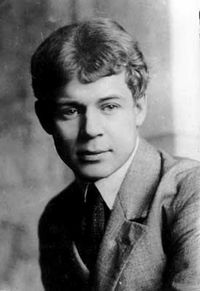 |
Sergey Yesenin (1895–1925) |
"Hopes Painted By The Autumn Cold" Hopes, painted by the autumn cold, are shining, My steady horse plods on, like quiet fate, His moist dun lip is catching at the lining When the coat, flapping, flutters and falls straight. On a far road the unseen traces, leading Neither to rest nor battle, lure and fade; The golden heel of day will flash, receding, And labors in the chest of years be laid. |
|
| Yevgeny Yevtushenko Yevgeny Yevtushenko Yevgeny Aleksandrovich Yevtushenko is a Soviet and Russian poet. He is also a novelist, essayist, dramatist, screenwriter, actor, editor, and a director of several films.-Early life:... (born 1933) |
Z
| Portrait | Person | Notable works | Sample |
|---|---|---|---|
| Nikolay Zabolotsky Nikolay Zabolotsky Nikolay Alexeyevich Zabolotsky - a Russian poet, children's writer and translator. He was a Modernist and one of the founders of the Russian avant-garde absurdist group Oberiu.-Life and work:... (1903–1958) |
|||
| Boris Zakhoder Boris Zakhoder Boris Vladimirovich Zakhoder was a Soviet poet and children's writer. He is best known for his translations of Winnie-the-Pooh, Mary Poppins, Alice's Adventures in Wonderland and other children's classics.- Biography :... (1918–2000) |
|||
| Yulia Zhadovskaya (1824–1883) |
The Contrast Dear, you will soon forget me, You I shall ne'er forget, You'll find new loves for old ones, For me love's sun is set. New faces soon will greet you, You'll choose yourself new friends, New thoughts you'll get and haply New joy to make amends: While I in silent sorrow Life's joyless way shall go, And how I love and suffer Only the grave will know. |
||
| Aleksey Zhemchuzhnikov Aleksey Zhemchuzhnikov Aleksey Mikhailovich Zhemchuzhnikov , 1821, Pochep, Chernigov Governorate, Russian Empire, - March 25 , 1908, Tambov, Russia) was a Russian poet, dramatist, essayist and literary critic, a nephew of Antony Pogorelsky, a cousin to A.K... (1821-1908) |
|||
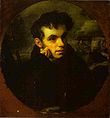 |
Vasiliy Zhukovsky (1783–1852) |
To a Floweret Floweret, faded and forsaken, Fragile beauty of the lea, Autumn's cruel hand hath taken All thy summer charms from thee. Heigho! that the years must bring This same destiny to all; One by one our joys take wing, One by one your petals fall. So each evening rings the knell Of some dream or rapture perished, And the fleeting hours dispel Each some vision fondly cherished. Life's illusions lie unmasked, And the star of hope burns paler. Has not some sage long since asked: Men or blossoms which are frailer? |
See also
- List of Russian language novelists
- List of Russian language playwrights
- Russian poetry
- Russian literatureRussian literatureRussian literature refers to the literature of Russia or its émigrés, and to the Russian-language literature of several independent nations once a part of what was historically Russia or the Soviet Union...
- Russian languageRussian languageRussian is a Slavic language used primarily in Russia, Belarus, Uzbekistan, Kazakhstan, Tajikistan and Kyrgyzstan. It is an unofficial but widely spoken language in Ukraine, Moldova, Latvia, Turkmenistan and Estonia and, to a lesser extent, the other countries that were once constituent republics...
- Russian cultureRussian cultureRussian culture is associated with the country of Russia and, sometimes, specifically with ethnic Russians. It has a rich history and can boast a long tradition of excellence in every aspect of the arts, especially when it comes to literature and philosophy, classical music and ballet, architecture...

